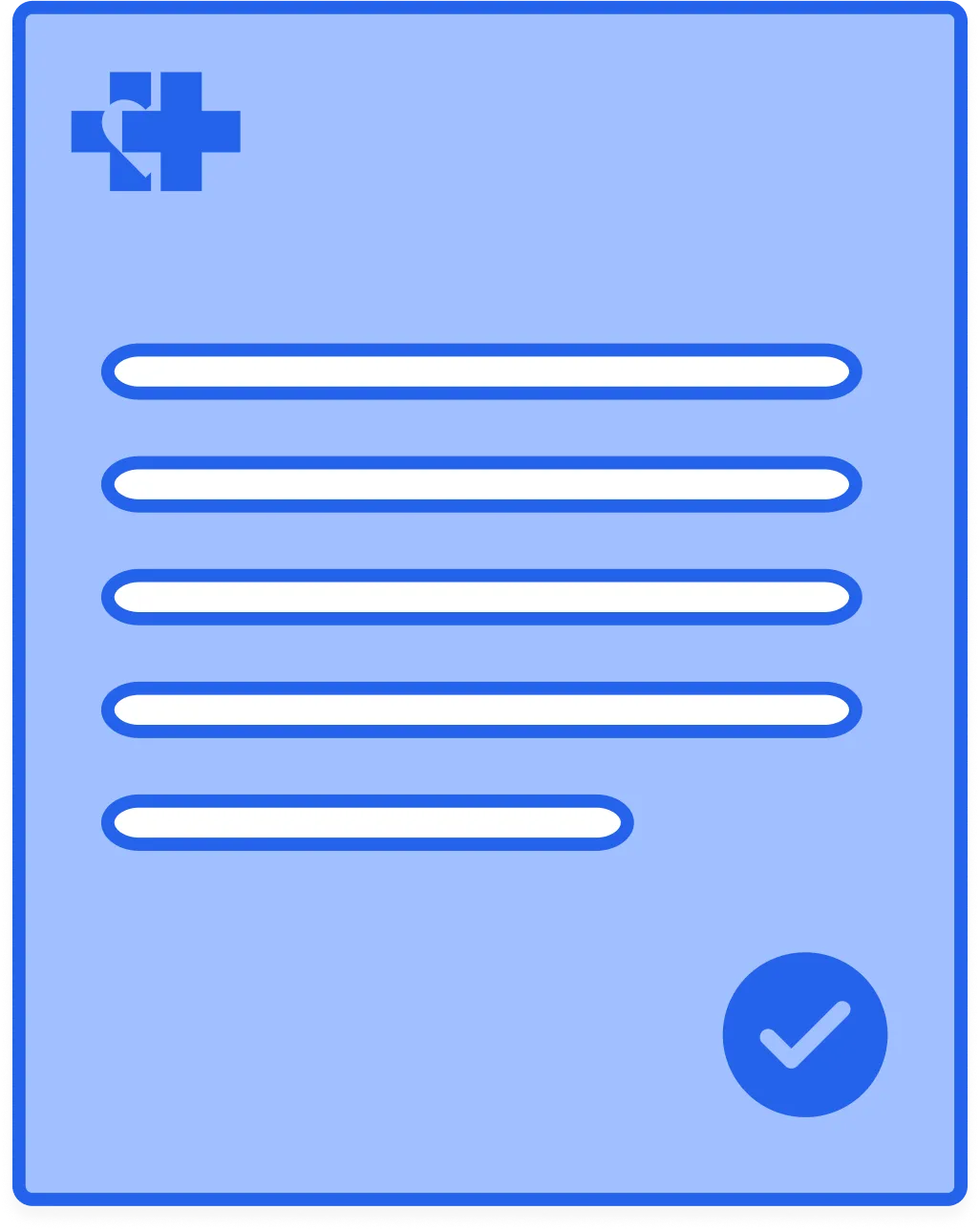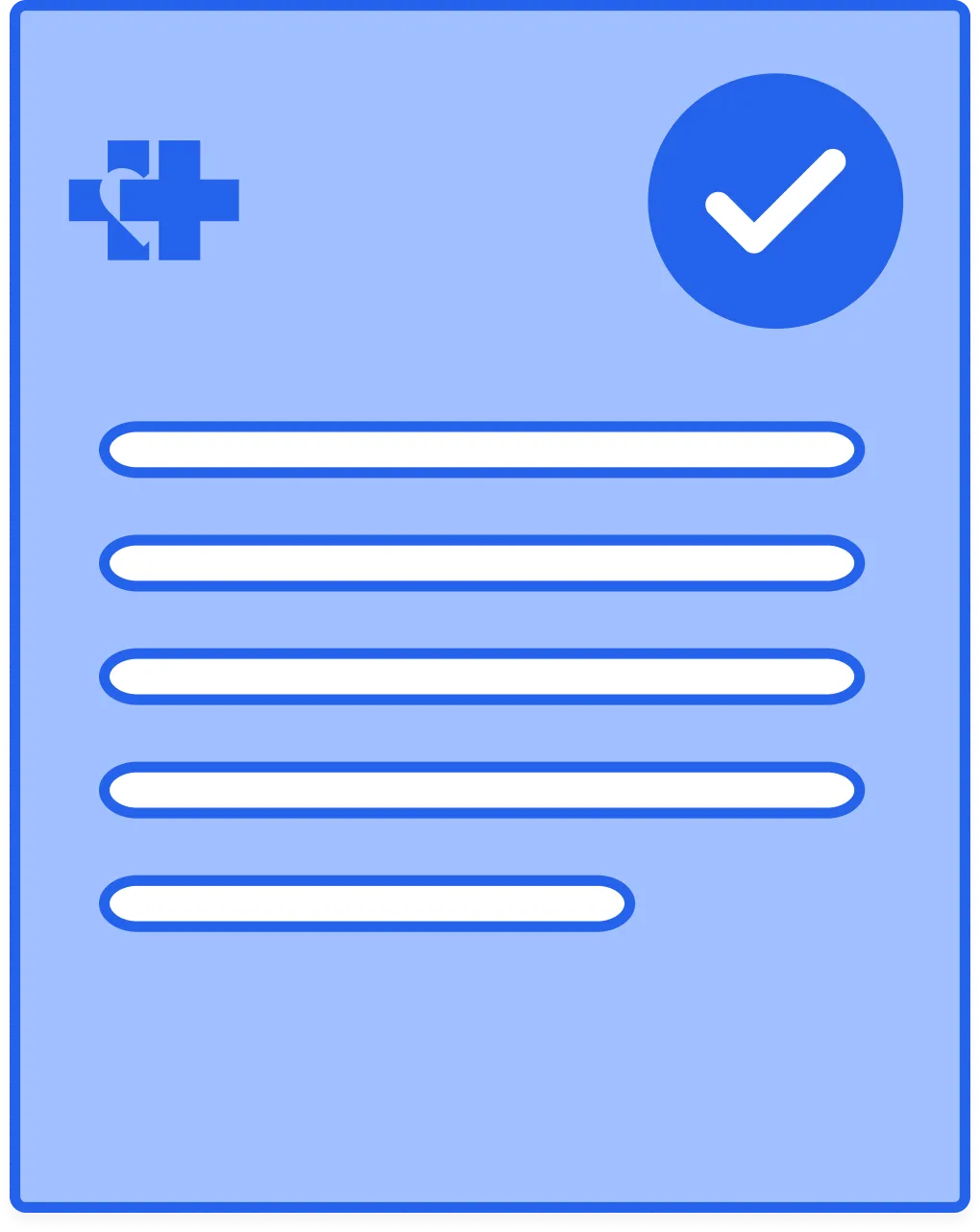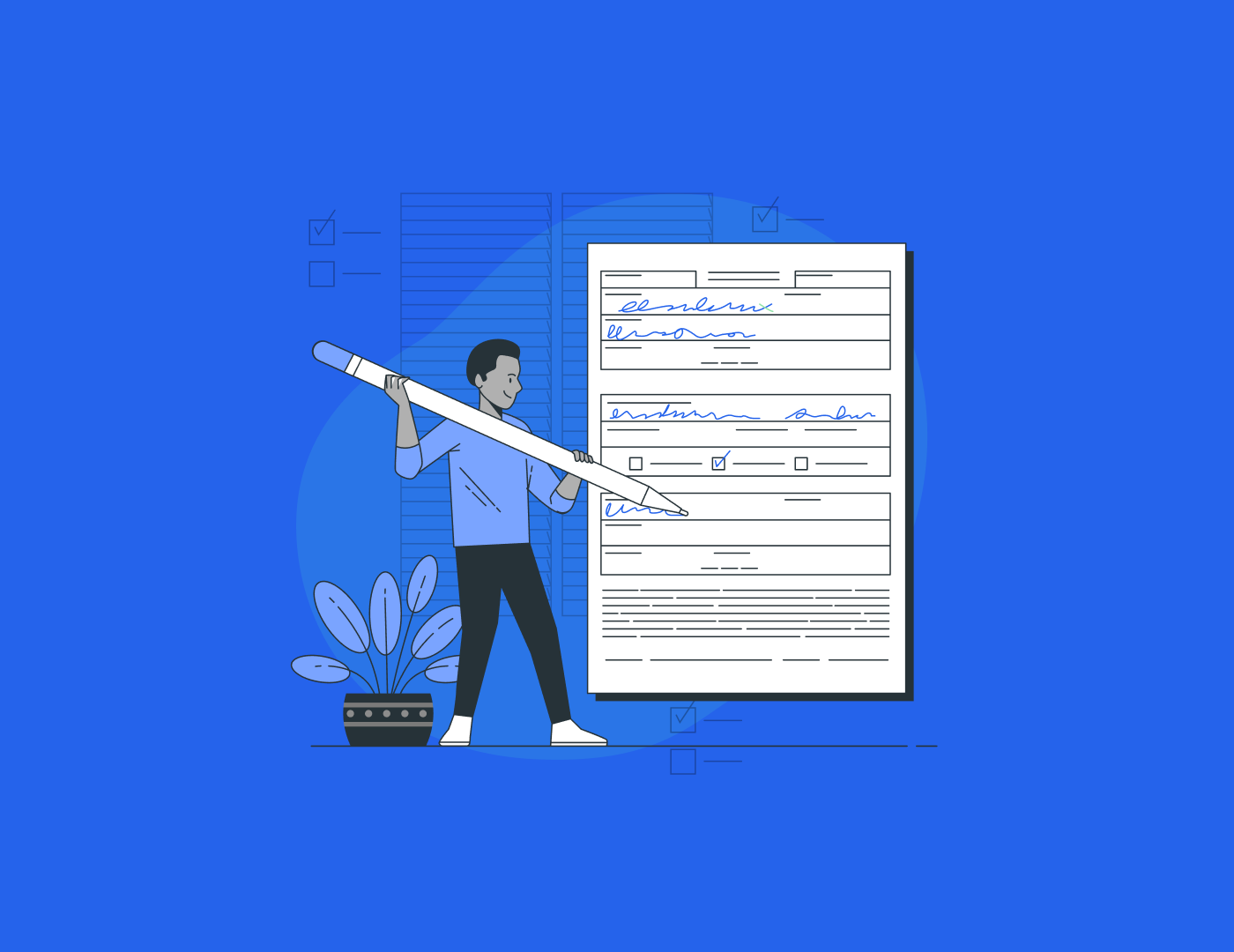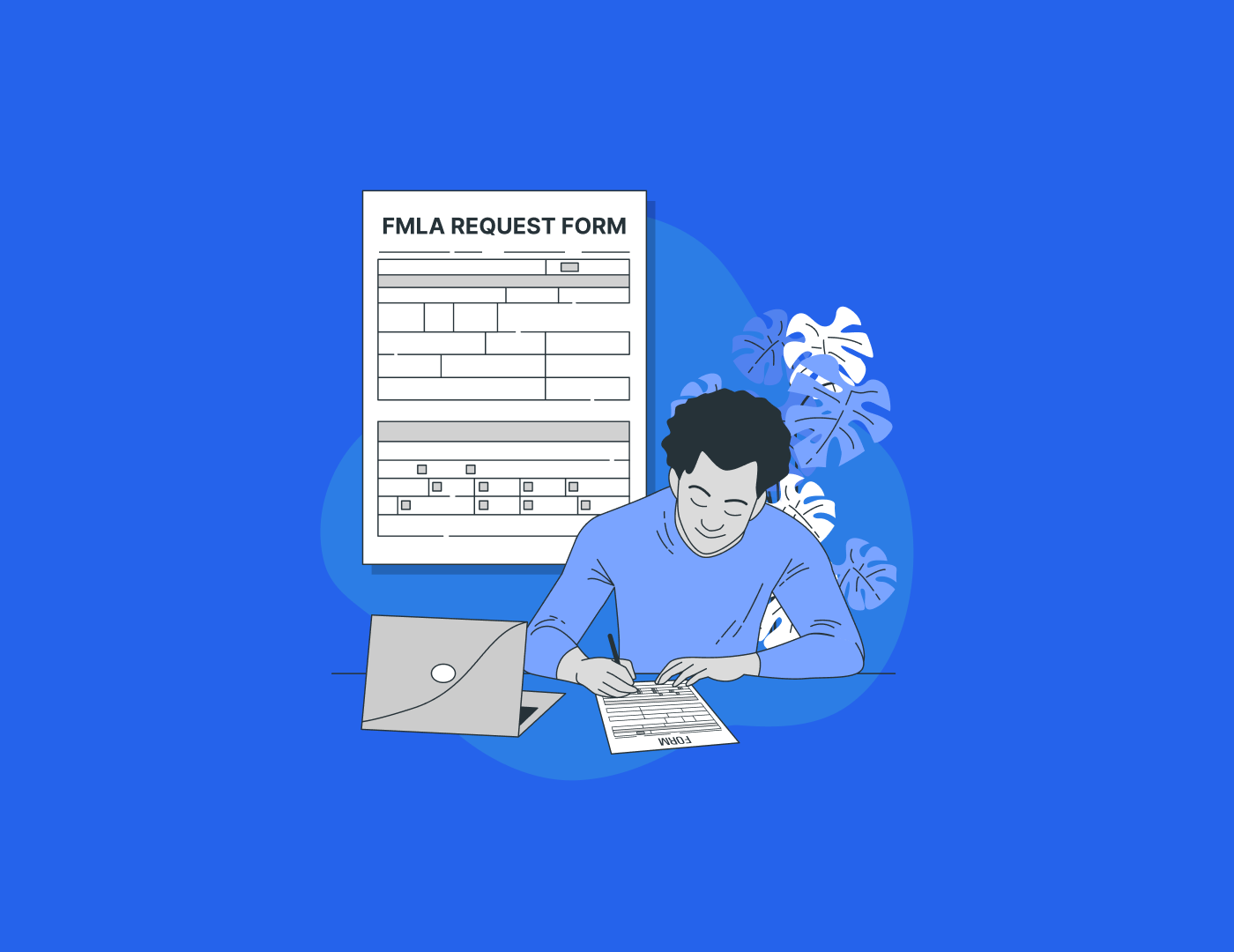Can My Employer Call To Verify My Doctors Note? Verification Guide [2025]



Meet the Author

Can My Employer Call To Verify My Doctors Note? Verification Guide
What you’ll learn in this guide
- Why Verify Notes?
- Verification Process Step-by-Step
- Allowed vs. Not Allowed Checks
- Your Rights & Protections
- Employer Rights & Limitations
- Common Scenarios & Solutions
- Best Practices Checklist
- FAQs
Can Employers Call To Verify Doctor’s Notes?
Yes, employers are allowed to call to verify doctor’s notes. However, the process is tightly regulated to protect employee privacy.
What Can and Can’t Employers Verify When They Call?
What employers can verify
- Confirm details of the note
- Ask for the healthcare providers information (license number or NPI)
- Confirm date of the evaluation
What employers can’t verify
- Does not allow access to any specific medical details or diagnoses.
Employers can't ask whatever questions they want. They need to adhere to HIPAA and respect personal health information and patient confidentiality.
Do Employers Verify Notes?
Yes they do. Employers usually call to verify a doctor’s note primarily to prevent misuse of leave policies, ensure compliance with company procedures, maintain workplace fairness, or if they suspect the authenticity of the note.
Employer verification can be a stressful process for both employers and employees. On one hand, employees worry about their privacy and medical confidentiality. On the other hand, employers must ensure compliance with company policies while preventing potential exploitation of leave systems. This guide tackles the main questions surrounding employee and employer rights regarding doctor’s notes, absences, and documentation integrity. By the end of this article, you'll understand the verification process, your rights, and best practices to avoid conflicts.
How Do Employers Verify Doctor’s Notes?
Employers have the authority to confirm that a medical note is legitimate and appropriately issued.
What Steps Are Involved In Employer Verification?
The process is usually straightforward and includes these steps:
- Notification: Employers notify employees about the fact that they will be verifying notes. They do not need to alert the employee that they are calling to verify.
- Contact Healthcare Provider: HR contacts the listed healthcare provider using the information on the doctor's notes or the employer verification service.
- Verification: HR confirms basic details only—date, authenticity, and provider details.
- Documentation: Employers document the verification process for compliance.
What Are Employers Allowed To Ask On A Verification Call?
You have certain rights under federal and state law which regulates what employers can and can’t ask about.
✅ What Are Employers Allowed to Check When Verifying a Doctor's Note?
- Contact the doctor’s office
- Verify identity of the licensed healthcare provider
- Verify NPI and license number of licensed healthcare provider
- Confirm details of the note
- Confirm general authenticity of the note
❌What Are Employers Not Allowed to Ask About?
- Specific medical condition details
- Any personal health information
- Medication and treatment specifics
- Genetic or family medical history
- Intrude on your privacy
Laws like the Health Insurance Portability and Accountability Act (HIPAA) ensure medical privacy, so employees aren’t required to disclose personal details beyond what's necessary to justify their absence. Any medical provider will be aware of this and as a result they will only confirm the basics.
What If I Want My Provider To Share Additional Details With My Employer?
If you'd like your healthcare provider to confirm details beyond the scope of what's not protected by HIPAA you must request that they do and provide written authorization. Many healthcare providers will not do this in order to ensure they stay compliant.
Just email support@mytrustmedical.com and we’ll help you with any request
If you're ready to get a doctor's note, Trust Medical can help you get a doctor's note in minutes and for less than $29.99. Just complete our medical intake (less than 3 minutes) and get started today.
What Rights And Protections Do I Have As An Employee?
Legal Frameworks (FMLA, ADA) The Family and Medical Leave Act (FMLA) allows eligible employees up to 12 weeks of unpaid leave for health-related needs, protecting their job throughout the period. Similarly, the Americans with Disabilities Act (ADA) can require employers to accommodate workers with temporary or chronic illnesses.
How Do You Qualify For FMLA? To qualify for FMLA (Family and Medical Leave Act), you must be an employee who has worked for your employer for at least 12 months, worked at least 1,250 hours during the past 12 months, and work at a location where the company employs 50 or more employees within a 75-mile radius; you can also only take FMLA leave for a "serious health condition" affecting you or a qualifying family member, such as a new child, a spouse, or a parent requiring care. Key points about FMLA eligibility:
- Employment duration: You must have worked for your employer for at least one year.
- Hours worked: You must have worked at least 1,250 hours within the past year.
- Company size: Your employer must have 50 or more employees within a 75-mile radius.
Qualifying reason: You must be taking leave for a "serious health condition" affecting you, your spouse, child, or parent.
What constitutes a "serious health condition" under FMLA:
- A condition requiring inpatient care
- A chronic condition requiring ongoing treatment
- Pregnancy and related complications
- A condition requiring multiple treatments or recovery from surgery
- A condition causing a period of incapacity lasting more than three consecutive days and requiring treatment from a healthcare provider
Please note that TrustMedical does not support any FMLA requests today. There are services that will do but do your research beforehand to ensure they can support this request.
State-Specific Protections
Some states provide stricter protections than federal mandates. For example, California’s Paid Sick Leave law guarantees paid leave for caregiving or personal health. Research your state’s employee protection laws to fully understand your local rights.
Privacy Rights and Medical Information Confidentiality
Employees have a right to confidentiality regarding their medical information. Even when verifying a doctor’s note, employers are legally obligated to limit their inquiries to only what's necessary.
Right to Medical Leave
Whether under FMLA, a state program, or internal company policies, employees have a right to take time off for legitimate medical needs without fear of retaliation or discrimination.
What Are My Rights With A Doctor's Note
Anything that falls outside the scope of Federal Regulations will be governed by the HR policy your company has in place. For notes issued by Trust Medical, which deals with simple absences, injuries, medical appointments, and time off to care for loved ones - the number of days you are allowed to take off and whether a doctor's note will cover you is up to your employers policies so please read them thoroughly before requesting a doctor's note.
The good news is Trust Medical notes are accepted by almost all major employers. We've worked with the biggest names to smaller startups.
Employer Rights and Limitations
What Employers Can Request
While employers must respect privacy, they are entitled to certain documentation. Employers may:
- Your Employer Decides When They Need A Note - Requiring a doctor’s note for an absence or after a specified number of absences is determined by company policies and completely up to your employer.
- Ask For a Fitness-For-Duty Certification - Especially after long-term medical leave. Note you may need to see a doctor live in order to obtain a fitness for duty certification. Most doctor's note services that provide asynchronous support are only able to document simple absences.
- Request Updated Documentation - For ongoing medical conditions that your employer wants to have on record. Note, they can't ask for specific details about your condition per HIPAA
Legitimate Reasons to Deny Notes
Employers can deny a doctor’s note if
- The Note is Unverifiable - There is no way for the employer to contact the doctor's office or the doctor to verify the note. (e.g., from an unlicensed provider or forged).
- The Note Doesn’t Meet Company Standards - This is why it's crucial to be up to speed on your employers policies. Items such as missing dates or lack of clear information could lead to denials. At Trust Medical we've worked with hundreds of employers and our notes cover 99.9% of employer requests. If for some reason it's unclear whether we meet your company's standards please don't hesitate to reach out to us.
- Fabricated or Fake Doctor's Note - If your doctor's note appears fabricated, potentially leading to legitimate investigations you may be denied. Remember that employers have certain assumptions/expectations about what a doctor's note should contain and they may not always be correct! As a result, to avoid confusion ask your employer what they need/expect or check your policy to make sure you are providing them with everything they need and avoiding issues.
Verification Procedures
Employers should follow these steps for lawful verification:
- Notify the Employee: Inform them if their note is being verified or clarification is required.
- Contact the Healthcare Provider (only to confirm the issuance, not to inquire about specifics).
- Document the Process to ensure compliance with state and federal laws.
Still unsure about the process and how to get a doctors note for work or school? You can read our full breakdown of the steps here.
Common Scenarios and Solutions
Scenario 1: Getting Fired Despite Having a Note
While illegal in most cases, employees may sometimes face termination despite presenting a valid doctor’s note. If this occurs:
- Document all interactions with your employer.
- File a complaint with your state labor department.
- Consult an attorney if you suspect wrongful termination.
Remember that most employment is at-will so unless your employer is violating a specific law you are unlikely to win a case in this situation. Additionally, Trust Medical only supports simple absences and we do not support FMLA, ADA, or more comprehensive time off requests.
Scenario 2: Multiple Sick Days
Consistently needing time off may raise questions. Avoid repeated conflicts by disclosing recurring conditions covered under ADA protections. It's important to be up front with your employer about what's going on with you if you're needing to be off frequently from work.
Scenario 3: Long-Term Illness
Extended leave requires proper FMLA documentation. Keep your employer informed and submit periodic updates. Remember to find a provider who can support these kinds of requests, which Trust Medical can't do.
Scenario 4: Pattern Absences
Consistently missing work on certain days could trigger scrutiny. Stay transparent and ensure all absences are backed by legitimate documentation.
Scenario 5: Emergency Situations
Urgent health matters are often unavoidable. Inform your employer as soon as possible, providing documentation promptly afterward. TrustMedical can help with retroactive absences and this is a common request we receive.
Minimum Requirements for Doctor’s Notes
When They're Required
Policies vary, but most companies only require documentation after:
- Taking more than one consecutive sick day.
- Significant absences affecting productivity.
- Chronic absenteeism exceeding acceptable standards.
Industry Standards
Some industries (e.g., healthcare, public safety) often enforce stricter attendance documentation standards, impacting when notes are used.
Company Policy Variations
Each enterprise sets attendance rules, often outlined in employee handbooks or contracts. Employees should review their terms regularly to ensure compliance.
Protecting Your Privacy
What You Must Disclose
Employees are usually only required to disclose:
- The duration of an expected absence.
- Whether they’re fit to return to work (if requested).
What You Can Keep Private
Details about medical diagnoses typically remain confidential unless ADA accommodations are requested. If you want to know what a doctors note looks like, check out our breakdown on what's included in a doctors note.
Communication Best Practices
Keep the following in mind while addressing absences:
- Inform your supervisor promptly regarding time off.
- Submit documentation as soon as possible.
- Maintain professional yet concise explanations for absences.
Documentation Records
Retain copies of every submitted doctor’s note, ensuring you can reference them in case of disputes.
Legal Consequences and Guidelines
Forged Documentation Penalties
Submitting falsified medical documents can lead to:
- Immediate dismissal from your position.
- Fines, legal penalties, or lawsuits.
Employee Rights Violations
Employers violating privacy laws by overstepping note-verification procedures could face consequences, including:
- Labor complaints filed with state agencies.
- Potential lawsuits for discrimination or retaliation.
Legal Recourse Options
If your rights are infringed upon, options include:
- Filing a claim with the EEOC (Equal Employment Opportunity Commission).
- Pursuing legal advice for potential lawsuits regarding ADA, FMLA, or privacy breaches.
Best Practices and Recommendations
Documentation Tips
- Submit doctor’s notes promptly to avoid unnecessary conflict.
- Make sure notes are clear and complete, listing exact absence dates and signed by a licensed provider.
Communication Guidelines
Open dialogue fosters trust—communicate promptly and professionally about absences where necessary.
Record Keeping
Keep a personal file with copies of all submitted documentation, email correspondence, and attendance policies.
Policy Compliance
Stay informed about your rights and responsibilities by reviewing your company’s specific attendance policies regularly.
Know Your Rights and Responsibilities
Balancing the line between employer rights and employee protections regarding doctor’s notes can be complex. From understanding verification procedures to safeguarding your privacy, this complete guide should equip you with the tools to handle workplace medical absences confidently.
If you believe your rights are being violated or have further questions, consult legal professionals or employment rights specialists for tailored advice. Empower yourself, protect your job, and ensure fairness in managing absences.
Ultimately, if you're still feeling unsure about the process we chronicle every little detail you would ever need to understand in our Ultimate Guide To Doctors Note 2025. Check it out and it'll cover everything you need to know!
Can My Employer Call To Verify My Doctors Note? Verification Guide
What you’ll learn in this guide
- Why Verify Notes?
- Verification Process Step-by-Step
- Allowed vs. Not Allowed Checks
- Your Rights & Protections
- Employer Rights & Limitations
- Common Scenarios & Solutions
- Best Practices Checklist
- FAQs
Can Employers Call To Verify Doctor’s Notes?
Yes, employers are allowed to call to verify doctor’s notes. However, the process is tightly regulated to protect employee privacy.
What Can and Can’t Employers Verify When They Call?
What employers can verify
- Confirm details of the note
- Ask for the healthcare providers information (license number or NPI)
- Confirm date of the evaluation
What employers can’t verify
- Does not allow access to any specific medical details or diagnoses.
Employers can't ask whatever questions they want. They need to adhere to HIPAA and respect personal health information and patient confidentiality.
Do Employers Verify Notes?
Yes they do. Employers usually call to verify a doctor’s note primarily to prevent misuse of leave policies, ensure compliance with company procedures, maintain workplace fairness, or if they suspect the authenticity of the note.
Employer verification can be a stressful process for both employers and employees. On one hand, employees worry about their privacy and medical confidentiality. On the other hand, employers must ensure compliance with company policies while preventing potential exploitation of leave systems. This guide tackles the main questions surrounding employee and employer rights regarding doctor’s notes, absences, and documentation integrity. By the end of this article, you'll understand the verification process, your rights, and best practices to avoid conflicts.
How Do Employers Verify Doctor’s Notes?
Employers have the authority to confirm that a medical note is legitimate and appropriately issued.
What Steps Are Involved In Employer Verification?
The process is usually straightforward and includes these steps:
- Notification: Employers notify employees about the fact that they will be verifying notes. They do not need to alert the employee that they are calling to verify.
- Contact Healthcare Provider: HR contacts the listed healthcare provider using the information on the doctor's notes or the employer verification service.
- Verification: HR confirms basic details only—date, authenticity, and provider details.
- Documentation: Employers document the verification process for compliance.
What Are Employers Allowed To Ask On A Verification Call?
You have certain rights under federal and state law which regulates what employers can and can’t ask about.
✅ What Are Employers Allowed to Check When Verifying a Doctor's Note?
- Contact the doctor’s office
- Verify identity of the licensed healthcare provider
- Verify NPI and license number of licensed healthcare provider
- Confirm details of the note
- Confirm general authenticity of the note
❌What Are Employers Not Allowed to Ask About?
- Specific medical condition details
- Any personal health information
- Medication and treatment specifics
- Genetic or family medical history
- Intrude on your privacy
Laws like the Health Insurance Portability and Accountability Act (HIPAA) ensure medical privacy, so employees aren’t required to disclose personal details beyond what's necessary to justify their absence. Any medical provider will be aware of this and as a result they will only confirm the basics.
What If I Want My Provider To Share Additional Details With My Employer?
If you'd like your healthcare provider to confirm details beyond the scope of what's not protected by HIPAA you must request that they do and provide written authorization. Many healthcare providers will not do this in order to ensure they stay compliant.
Just email support@mytrustmedical.com and we’ll help you with any request
If you're ready to get a doctor's note, Trust Medical can help you get a doctor's note in minutes and for less than $29.99. Just complete our medical intake (less than 3 minutes) and get started today.
What Rights And Protections Do I Have As An Employee?
Legal Frameworks (FMLA, ADA) The Family and Medical Leave Act (FMLA) allows eligible employees up to 12 weeks of unpaid leave for health-related needs, protecting their job throughout the period. Similarly, the Americans with Disabilities Act (ADA) can require employers to accommodate workers with temporary or chronic illnesses.
How Do You Qualify For FMLA? To qualify for FMLA (Family and Medical Leave Act), you must be an employee who has worked for your employer for at least 12 months, worked at least 1,250 hours during the past 12 months, and work at a location where the company employs 50 or more employees within a 75-mile radius; you can also only take FMLA leave for a "serious health condition" affecting you or a qualifying family member, such as a new child, a spouse, or a parent requiring care. Key points about FMLA eligibility:
- Employment duration: You must have worked for your employer for at least one year.
- Hours worked: You must have worked at least 1,250 hours within the past year.
- Company size: Your employer must have 50 or more employees within a 75-mile radius.
Qualifying reason: You must be taking leave for a "serious health condition" affecting you, your spouse, child, or parent.
What constitutes a "serious health condition" under FMLA:
- A condition requiring inpatient care
- A chronic condition requiring ongoing treatment
- Pregnancy and related complications
- A condition requiring multiple treatments or recovery from surgery
- A condition causing a period of incapacity lasting more than three consecutive days and requiring treatment from a healthcare provider
Please note that TrustMedical does not support any FMLA requests today. There are services that will do but do your research beforehand to ensure they can support this request.
State-Specific Protections
Some states provide stricter protections than federal mandates. For example, California’s Paid Sick Leave law guarantees paid leave for caregiving or personal health. Research your state’s employee protection laws to fully understand your local rights.
Privacy Rights and Medical Information Confidentiality
Employees have a right to confidentiality regarding their medical information. Even when verifying a doctor’s note, employers are legally obligated to limit their inquiries to only what's necessary.
Right to Medical Leave
Whether under FMLA, a state program, or internal company policies, employees have a right to take time off for legitimate medical needs without fear of retaliation or discrimination.
What Are My Rights With A Doctor's Note
Anything that falls outside the scope of Federal Regulations will be governed by the HR policy your company has in place. For notes issued by Trust Medical, which deals with simple absences, injuries, medical appointments, and time off to care for loved ones - the number of days you are allowed to take off and whether a doctor's note will cover you is up to your employers policies so please read them thoroughly before requesting a doctor's note.
The good news is Trust Medical notes are accepted by almost all major employers. We've worked with the biggest names to smaller startups.
Employer Rights and Limitations
What Employers Can Request
While employers must respect privacy, they are entitled to certain documentation. Employers may:
- Your Employer Decides When They Need A Note - Requiring a doctor’s note for an absence or after a specified number of absences is determined by company policies and completely up to your employer.
- Ask For a Fitness-For-Duty Certification - Especially after long-term medical leave. Note you may need to see a doctor live in order to obtain a fitness for duty certification. Most doctor's note services that provide asynchronous support are only able to document simple absences.
- Request Updated Documentation - For ongoing medical conditions that your employer wants to have on record. Note, they can't ask for specific details about your condition per HIPAA
Legitimate Reasons to Deny Notes
Employers can deny a doctor’s note if
- The Note is Unverifiable - There is no way for the employer to contact the doctor's office or the doctor to verify the note. (e.g., from an unlicensed provider or forged).
- The Note Doesn’t Meet Company Standards - This is why it's crucial to be up to speed on your employers policies. Items such as missing dates or lack of clear information could lead to denials. At Trust Medical we've worked with hundreds of employers and our notes cover 99.9% of employer requests. If for some reason it's unclear whether we meet your company's standards please don't hesitate to reach out to us.
- Fabricated or Fake Doctor's Note - If your doctor's note appears fabricated, potentially leading to legitimate investigations you may be denied. Remember that employers have certain assumptions/expectations about what a doctor's note should contain and they may not always be correct! As a result, to avoid confusion ask your employer what they need/expect or check your policy to make sure you are providing them with everything they need and avoiding issues.
Verification Procedures
Employers should follow these steps for lawful verification:
- Notify the Employee: Inform them if their note is being verified or clarification is required.
- Contact the Healthcare Provider (only to confirm the issuance, not to inquire about specifics).
- Document the Process to ensure compliance with state and federal laws.
Still unsure about the process and how to get a doctors note for work or school? You can read our full breakdown of the steps here.
Common Scenarios and Solutions
Scenario 1: Getting Fired Despite Having a Note
While illegal in most cases, employees may sometimes face termination despite presenting a valid doctor’s note. If this occurs:
- Document all interactions with your employer.
- File a complaint with your state labor department.
- Consult an attorney if you suspect wrongful termination.
Remember that most employment is at-will so unless your employer is violating a specific law you are unlikely to win a case in this situation. Additionally, Trust Medical only supports simple absences and we do not support FMLA, ADA, or more comprehensive time off requests.
Scenario 2: Multiple Sick Days
Consistently needing time off may raise questions. Avoid repeated conflicts by disclosing recurring conditions covered under ADA protections. It's important to be up front with your employer about what's going on with you if you're needing to be off frequently from work.
Scenario 3: Long-Term Illness
Extended leave requires proper FMLA documentation. Keep your employer informed and submit periodic updates. Remember to find a provider who can support these kinds of requests, which Trust Medical can't do.
Scenario 4: Pattern Absences
Consistently missing work on certain days could trigger scrutiny. Stay transparent and ensure all absences are backed by legitimate documentation.
Scenario 5: Emergency Situations
Urgent health matters are often unavoidable. Inform your employer as soon as possible, providing documentation promptly afterward. TrustMedical can help with retroactive absences and this is a common request we receive.
Minimum Requirements for Doctor’s Notes
When They're Required
Policies vary, but most companies only require documentation after:
- Taking more than one consecutive sick day.
- Significant absences affecting productivity.
- Chronic absenteeism exceeding acceptable standards.
Industry Standards
Some industries (e.g., healthcare, public safety) often enforce stricter attendance documentation standards, impacting when notes are used.
Company Policy Variations
Each enterprise sets attendance rules, often outlined in employee handbooks or contracts. Employees should review their terms regularly to ensure compliance.
Protecting Your Privacy
What You Must Disclose
Employees are usually only required to disclose:
- The duration of an expected absence.
- Whether they’re fit to return to work (if requested).
What You Can Keep Private
Details about medical diagnoses typically remain confidential unless ADA accommodations are requested. If you want to know what a doctors note looks like, check out our breakdown on what's included in a doctors note.
Communication Best Practices
Keep the following in mind while addressing absences:
- Inform your supervisor promptly regarding time off.
- Submit documentation as soon as possible.
- Maintain professional yet concise explanations for absences.
Documentation Records
Retain copies of every submitted doctor’s note, ensuring you can reference them in case of disputes.
Legal Consequences and Guidelines
Forged Documentation Penalties
Submitting falsified medical documents can lead to:
- Immediate dismissal from your position.
- Fines, legal penalties, or lawsuits.
Employee Rights Violations
Employers violating privacy laws by overstepping note-verification procedures could face consequences, including:
- Labor complaints filed with state agencies.
- Potential lawsuits for discrimination or retaliation.
Legal Recourse Options
If your rights are infringed upon, options include:
- Filing a claim with the EEOC (Equal Employment Opportunity Commission).
- Pursuing legal advice for potential lawsuits regarding ADA, FMLA, or privacy breaches.
Best Practices and Recommendations
Documentation Tips
- Submit doctor’s notes promptly to avoid unnecessary conflict.
- Make sure notes are clear and complete, listing exact absence dates and signed by a licensed provider.
Communication Guidelines
Open dialogue fosters trust—communicate promptly and professionally about absences where necessary.
Record Keeping
Keep a personal file with copies of all submitted documentation, email correspondence, and attendance policies.
Policy Compliance
Stay informed about your rights and responsibilities by reviewing your company’s specific attendance policies regularly.
Know Your Rights and Responsibilities
Balancing the line between employer rights and employee protections regarding doctor’s notes can be complex. From understanding verification procedures to safeguarding your privacy, this complete guide should equip you with the tools to handle workplace medical absences confidently.
If you believe your rights are being violated or have further questions, consult legal professionals or employment rights specialists for tailored advice. Empower yourself, protect your job, and ensure fairness in managing absences.
Ultimately, if you're still feeling unsure about the process we chronicle every little detail you would ever need to understand in our Ultimate Guide To Doctors Note 2025. Check it out and it'll cover everything you need to know!




Get Your Board Certified Doctor’s Note In 10 Minutes



Still have questions? Find answers here:
Yes! We only work with board certified doctors and we match you to a provider who is licensed in your state. Every provider thoroughly reviews your intake and then makes a decision on whether to approve a doctors note. Employers love us because of our strict adherence to all laws as well as the fact that our service is powered by real people who you can get on the phone with quickly to verify the authentcity of our notes.
A doctor's note is an official medical document that verifies your need for time off work or school. It's issued by a licensed healthcare provider and typically includes their credentials, contact information, examination date, and when you can return to work. This documentation serves as professional communication between your medical provider and employer while protecting your privacy.
People trust us. We recognize the importance of your job and your academic standing, which is why we adhere to the highest standards of integrity and ensure we're fully compliant.Additionally, we know this process can be anxiety inducing, which is why we take pride on our customer support and we make it extremely easy to speak to us and help you get your issues resolved.
We believe so much in what we do that we offer an 100% money back guarantee.
All of our doctors credentials are public and easily verifiable. Additionally, all of our notes contain tamper proof watermarks and all the details your employer or school needs to feel confident.We set the standard for doctor's notes.
Trust Medical is a telehealth service that provides certified medical excuse notes. We connect clients with licensed healthcare professionals to ensure authenticity. Our goal is to make obtaining necessary documentation fast and reliable.
Yes, all our notes are fully HIPAA compliant. They include only essential work-related information without disclosing private medical details unless specifically requested. Our board-certified physicians ensure complete privacy compliance.
Yes, employers accept 99.9% of Trust Medical doctor's notes. Our notes include all required components: comprehensive intake/evaluation, board certified doctor licensed in your state, official letterhead, licensed physician's signature, provider contact details, and clear return-to-work dates. We offer a 100% acceptance guarantee because our notes meet all legal and professional standards.
250K+






Money Back Guarantee!










